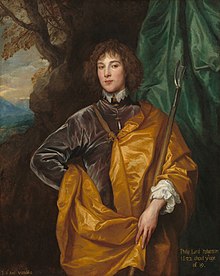Philip Wharton, 4th Baron Wharton

Philip Wharton, 4th Baron Wharton ( April 8, 1613 , † February 4 or 5, 1695 ) was an English politician of the Stuart period .
Origin and family environment
Philip Wharton belonged to an old English noble family who had lived in northern England on the border with Scotland since the 13th century. He was the son of Sir Thomas Wharton (1587-1622) and the daughter of Robert Carey, 1st Earl of Monmouth . This Thomas Wharton was the pre-deceased eldest son of Philip Wharton, 3rd Baron Wharton (1555-1625). Philip Wharton was born on April 8, 1613 and inherited the title of his grandfather of the same name in 1625 at the age of 12.
Life and military-political career
Philip Wharton was at Eton College educated and then attended from May 3, 1625, the Exeter College of Oxford University . During this time he made a three-year trip with his brother Thomas until July 6, 1629. After completing his studies, he was admitted to Lincoln's Inn on January 18, 1637 . Before March 1, 1638, the king asked him to take part in the 1st Bishop's War and to remain in the north until his war-ravaged lands were restored. He was asked by Charles I through a writ of summons to take his seat in the House of Lords in the so-called Short Parliament . In parliament he then voted on April 24, 1640 against the king's demand for financial support. Thereafter, in November 1640, he was one of the noblemen whom the king summoned to negotiate with the Scots in Ripon and London. As a declared Puritan , he then took part in the civil war that followed on the part of Parliament as one of the few peers . By resolution of Parliament he was appointed Lord Lieutenant of the County of Lancaster on May 5, 1642 and on June 24, 1642 of the County of Buckinghamshire . Finally, on September 11, 1644, he became Lord Lieutenant of Westmorland County . He was also from May 27 to August 22, 1643 and from February 26 to June 5, 1645 Speaker of the House of Lords.
Philip Wharton was also militarily active on the side of the parliamentary troops. On July 5, 1642 he was appointed Colonel General for a planned campaign to Ireland, which never took place. He took part as colonel of an infantry regiment under the Earl of Essex on October 23, 1642 in the Battle of Edgehill ; not very glorious, however, because his regiment simply ran away without fighting. He was then appointed Commander for the West Indies on November 2, 1643 . He was then Commissioner of Parliament for the negotiations on July 28, 1645 with the Scots in Berwick . On December 1, 1645, the commoners petitioned the king to give Wharton the title of earl, but the king did not reply. After the Pride 'purge' of Parliament , Wharton retired into private life, but occasionally remained an adviser to Oliver Cromwell . Although he was appointed by Lord Protector Cromwell to the Other House , a kind of substitute upper house, he never attended the meetings.
After the restoration
Philip Wharton had joined the forces of restoration of the Stuart monarchy early on after the abdication of Richard Cromwell , who had succeeded his father Oliver as lord protector. He belonged to the cavalcade that King Charles II solemnly overtook from Greenwich to London on March 19, 1660. The young king had not forgotten Wharton's involvement in the civil war. After he had consolidated his position as king, he gradually began to take action against former opponents of the king. Wharton was imprisoned in the Tower on February 16, 1676 for his involvement in the Civil War . He was pardoned after asking the king for mercy and forgiveness and was able to leave the Tower. After Jacob II , a Catholic, ascended to the throne , Wharton retreated to the mainland but returned in 1686. Politically he was a Whig and one of the first to stand up after the expulsion of Jacob II. William III. connected. This made him a member of the Privy Council ( Privy Council ). Wharton was married three times. He died on February 4 or 5, 1695 and was succeeded by his son Thomas as the 5th Baron Wharton.
Individual evidence
- ↑ a b c d e The Complete Peerage , Volume XII, 2, pp. 602-606.
- ↑ The Complete Peerage , Volume XII, footnote c to p. 603.
- ^ A b English Historical Review , Volume XLIX, p. 48.
- ↑ Lords Journal Volume IV, p. 625 and Volume V, pp. 85, 310 ff.
- ↑ Lords Journal Volume V, p. 1811.
- ↑ Lords Journal , Volume VII, pages 514/15.
- ^ The Complete Peerage , Volume XII, p. 604, footnote h
Web links
| predecessor | Office | successor |
|---|---|---|
| Philip Wharton |
Baron Wharton 1625-1695 |
Thomas Wharton |
| personal data | |
|---|---|
| SURNAME | Wharton, Philip, 4th Baron Wharton |
| BRIEF DESCRIPTION | English Conservative Party politician and peer |
| DATE OF BIRTH | April 8, 1613 |
| DATE OF DEATH | February 4, 1695 or February 5, 1695 |